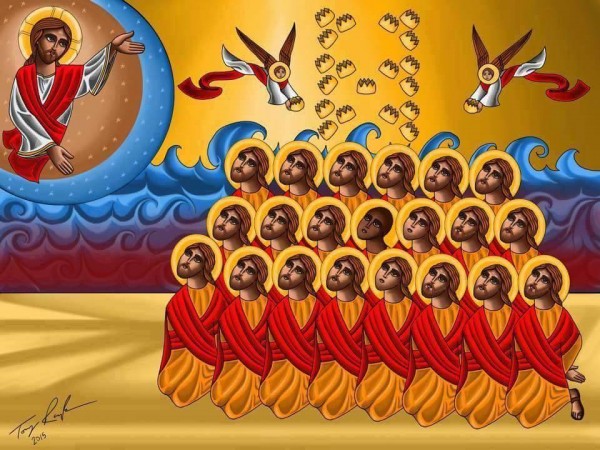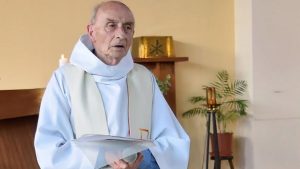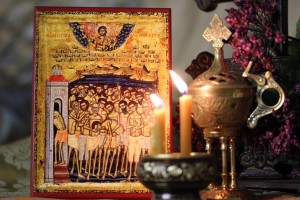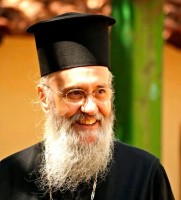Many have heard the dramatic story of the twenty-one Coptic Orthodox Christians working in Libya who were captured and beheaded by ISIS as part of their ongoing campaign of provocation and terror. What may not be as well known in the media is that all twenty-one were offered the chance to save their lives by embracing Islam, and that all twenty-one refused, confessing Christ and dying for Him as true Christian martyrs. Indeed, it appears that the Coptic Orthodox Church has already canonized them (i.e., declared them to be saints), and some ask what response the Chalcedonian Orthodox Churches should make as regards these courageous Christians. The question involves a look at the evolving practice of official canonization in the church.
People are most familiar with the process of canonization in the Roman Catholic Church, since the Roman communion is the best-known and largest church in the west. Over the years, that church has developed a complicated system and lengthy process which must be followed before anyone can be officially declared a saint. Previous to that, declarations of sainthood happened more informally and locally. But by the tenth century, the pope had secured control of all church canonizations, for in 1181, Pope Innocent III reserved all such declarations of sainthood to himself. Even then, it was not until the time of the Counter-Reformation in 1634 that a full process for canonization emerged, with nominations, judges, advocates, counter-advocates (the so-called “devil’s advocates”), trials, and the final verdict. And, of course, the whole process, as well as taking years, also took money to amass testimonials and keep the cause alive. A certain number of authenticated miracles were also required to push a candidate along the long path to being called “Blessed” (a kind of lesser rank of holiness) and then further along yet to actual sainthood. It was all very formal, and organized, and official, and lengthy, and expensive.
It was also very different than it was in the early church. The term “saint” of course simply means “holy one” (Greek agios), and was used by St. Paul to describe any baptized and faithful Christian. Certain people whose Christian faith was clearly authentic and whose lives merited wider attention, were called saints, or described as “holy” (e.g., not just “Paul”, but “holy Paul”). This of course included the martyrs, believers who had suffered for their Lord. There was no process of canonization required; the conviction and declaration of the local church that these people were truly holy was sufficient. Such was the credibility of the laity’s testimony, and the Church’s confidence that its faithful could discern true holiness when they saw it. If a church’s bishop was martyred, for example, the faithful treasured the story of their bishop’s heroic end and accorded him the appropriate honour. They would keep and venerate his relics, celebrate his martyrdom at its yearly anniversary, and ask for his heavenly intercession. It was a strictly local affair, and if other churches from neighbouring cities didn’t want to join in the acknowledgment of that bishop, they didn’t have to, and no one tried to make them. But examples of heroic holiness were rare enough, and usually the neighbouring churches were all too happy to acknowledge the sanctity and tell the story of any martyr. Such stories were shared with Christians in other cities, and sometimes relics were also shared, so that the martyr’s anniversary celebration in one city was sometimes kept in neighbouring cities as well.
Orthodoxy is heir to this local and informal practice of the early church. We are somewhat more formal than our ancestors were. Nowadays, a potential saint is discussed by the local synod of bishops, and discussions are held about whether or not to canonize him or her. Then the liturgical services are written, and the icon painted, and the day for official canonization (called the saint’s “glorification”) arrives. The final memorial service is said for him, and then prayers are no longer said for him, but rather to him. But even before this final episcopal process begins, the people still know whether or not the “candidate” is a saint. As in the earlier days, the Church still recognizes holiness when it sees it, and local “unofficial” veneration always precedes the “official” one. After all, it is God who makes saints, not bishops. And it seems clear enough that God has made twenty-one new saints in Libya lately. Whether or not the bishops give their official stamp of liturgical approval is almost irrelevant insofar as goes the love and veneration of the people of God. It seems likely that the bishops, whose divine task it is to lead the Church and be its liturgical voice, will respond by officially glorifying these martyrs. The laity have said Axios! and the bishops may well respond Amen!




















